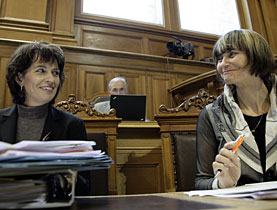
Aid groups hail boost for development funds

The Senate has come out in favour of a gradual increase in development aid from 0.37 per cent to 0.5 per cent of gross national product.
A coalition of aid agencies and church groups, which had campaigned for the United Nations Millennium goal of 0.7 per cent, welcomed the decision. It is confident that the other parliamentary chamber, the House of Representatives will follow suit.
It took the Senate more than one session this week to discuss the government’s development budget. The cabinet slated a sum of SFr5.3 million ($4.9 million) – or 0.4 per cent of GNP – over the next four years.
Other proposals, backed by most parties except the rightwing and partly the Christian Democrats, called for a gradual boost by 2015.
“It was the first time that parliament discussed a possible increase in development funds,” says Michèle Laubscher of Alliance Sud, which coordinated a campaign by 70 aid organisations and church groups.
She pointed out that a two-thirds majority of the chamber approved the proposal for a financial increase.
“There was a lively debate and speakers cited a wide range of reasons. What’s more, nobody called for the budget to be cut,” Laubscher told swissinfo.
Image, credibility
Dick Marty, chairman of the foreign affairs committee, said Switzerland was one of the richest countries in the world, but its contribution lagged behind those of other countries.
“Development aid is not only an act of solidarity, but also an investment in a better – and safer – world, a precondition for economic growth,” he said.
He pointed out that this was important for a country like Switzerland with its export industry and would also help stem the flood of people who leave their home countries to seek a better existence elsewhere.
Claude Hêche and Felix Gutzwiler pleaded for an increase in development aid saying the image of Switzerland was at stake.
Several senators also pointed out that the government more than once confirmed their pledge to adhere to the Millennium goal of reducing poverty by half.
Simonetta Sommaruga pointed out that development aid had become an increasingly complex business about power and influence.
“Switzerland does not link development aid with ambitions for power. We have a lot of experience of cooperating not only with governments but also with civil society.”
She said it was naïve to believe that more funds translated automatically in more aid.
“Switzerland has a responsibility on the world stage. We have no right to demand that others live up to international standards if we fail to do so ourselves.”
Efficiency
For her part, Economics Minister Doris Leuthard said that development aid was also an element taken into account when seats are allocated in international organisations, including the World Bank and the International Monetary Fund.
She shares the aid portfolio with Foreign Minister Micheline Calmy-Rey, who dismissed unfounded criticism of development aid projects.
Opponents of an increase in funding warned of the financial impact for the federal budget and of possible calls by other sectors for more subsidies.
The NGO Alliance Sud says it is legitimate to raise the issue. “But it is first of all a political question: Is Switzerland committed to a safer world or not?” said Laubscher.
She compared this week’s discussion with that in the House of Representatives in June.
“It was striking to see that the debate in the Senate was more open. The reorganisation of the foreign ministry’s Swiss Development Agency (SDC) might have contributed to an easing of the situation and the tone in parliament.”
She is confident that the House will join the Senate when it resumes its debate during the next session.
The Neue Zürcher Zeitung newspaper, known for its critical stance towards Calmy-Rey’s policies, cautiously supported proposals for a slight increase in development aid in its editorial on Thursday.
It encouraged the Senate to prove its reputation of taking well-balanced decisions and opt for “quality and quantity” in development aid. It called for what it described as a “sustainable rather than a sudden increase”.
swissinfo, Urs Geiser
The government proposed a rate of 0.4% of GNP – an increase of SFr800 annually – for development aid.
In June the House of Representatives voted for 0.4%.
The Senate has come out in favour of 0.5%.
The House will discuss the issue again later this year.
The UN Millennium Goal calls for 0.7%.
The 1992 Earth Summit at Rio challenged industrial countries to devote 0.7% of their gross national income to development aid.
Switzerland set itself the goal of 0.4%, which it has met only once, in 2005.
In 2007 Switzerland contributed 0.37%, the same proportion as Germany.
Only Norway, Sweden, Luxembourg, Denmark and the Netherlands exceeded the UN goal, contributing from 0.8 to 0.95%.
Of Switzerland’s main neighbours, France contributed 0.39 and Austria 0.49%, while Italy lagged far behind with 0.19%.
The biggest donor in money terms, the US, was the smallest in percentage terms, with 0.16%.
The SDC is the part of the Swiss foreign ministry responsible for international development.
It employs around 550 people in Switzerland and abroad.
Its tasks include not only the coordination of cooperation with developing countries, but also emergency relief after natural disasters.
It is active in 17 countries, but will reduce its activities to 14 countries by 2010.
Seco is the federal government’s centre of expertise for all core issues relating to economic policy.
It provides economic development cooperation as part of Swiss efforts to alleviate poverty in the world.

In compliance with the JTI standards
More: SWI swissinfo.ch certified by the Journalism Trust Initiative































You can find an overview of ongoing debates with our journalists here . Please join us!
If you want to start a conversation about a topic raised in this article or want to report factual errors, email us at english@swissinfo.ch.